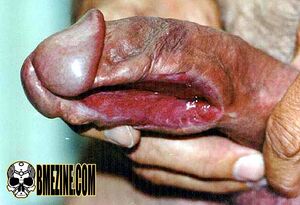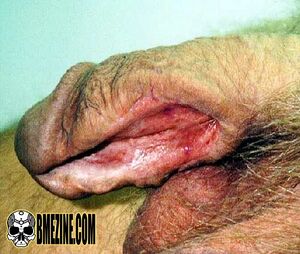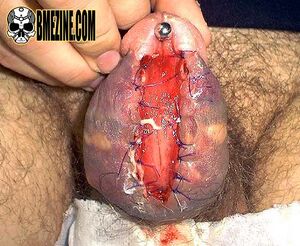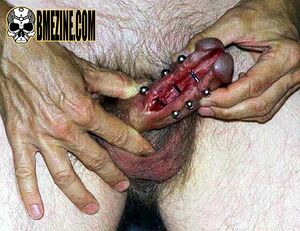Subincision
Subincision is the bisection of the underside of the penis (from the urethra to the raphe; versus a superincision which is the top half).
Contents
- Placement
- Benefits
- Procedure
- Healing and Aftercare
- Long Term Health Issues
- History and Culture
- Related Risks
- See Also
Placement
Generally speaking, the incision can go from the urethral opening in the glans to the base of the shaft where it meets the scrotum (although not all men will split this far; a split that is just in the glans is called a meatotomy and is more common). As with any surgery, the risks include infection and massive bleeding due to hitting a vein or artery. However, the amount of blood flow in this area is also a good thing, as it helps the healing process.
Benefits
As far as why, there are a few basic reasons people may choose to do a sub-incision:
- The procedure can be done for the pleasure of the recipient, as the inside of the penis often feels better than the outside — and even if it's not specifically "better", it definitely exposes more nerves to direct sexual contact.
- It can be done for the pleasure of the recipient's partner — the penis becomes wider and more textured, and can change form slightly during sex. One woman described it as if waves were moving up and down the bottom of her partner's penis during intercourse. In addition, by rubbing the sub-incision over the clitoris, it allows a woman to come "inside" a man's genitals.
- Some people do it for simple aesthetic or fetishistic value, either because they like the way it looks, or for reasons such as the philosophical concept of removing urination from the shaft of the penis (relocating it to the base) makes the penis purely an organ of pleasure.
Procedure
Many people have performed this procedure on themselves, most commonly using a "Clamp and Cut" procedure. However it is a surgical procedure and should be done by an experienced practitioner, or at a minimum by an extremely well informed individual.
Healing and Aftercare
Sub-incisions tend to heal quite quickly — usually within a month or so. Saline soaks can help alleviate swelling. It would be wise to avoid sexual contact until the entire healing process is finished. However, if you must have intercourse, always wear a condom with a fresh modification (this is important for all genital modifications, including piercings).
Long Term Health Issues
Sub-incision will greatly affect urination, usually creating the "shower head" condition (although not always). Some people carry a small metal tube with them to allow them to urinate normally should they still desire to stand. As far as how sex is affected, an open urethra is more sensitive, so at first it may be a bit much (many people suggest that only those that enjoy urethral play such as sounding should get a sub-incision). In addition to the sexual games mentioned above, one sub-incised person describes that his girlfriend likes the subincision because she can fellate him to ejaculation without getting any in her mouth — this happens even with intercourse, unless he is very deep inside. Finally, sub-incision (or even a meatotomy) greatly reduces ejaculatory range — this can be increased by placing a slight pressure on the end of the sub-incision at the point of ejaculation. It's like a hose; a subincision makes a very large nozzle, and like the end of a hose, you have to squeeze it off if you're going for distance.
History and Culture
Anthropologists have documented use of sub-incision rituals amongst numerous Aboriginal Australian tribes in the north-west of the country, principally amongst the Yiwara and Pidjandara tribes. Certain studies have also reported procedures resembling sub-incision in Fiji, New Guinea, Brazil and Kenya, although the procedure is far less common and less ritualized amongst groups in these parts of the world compared to Australia.




